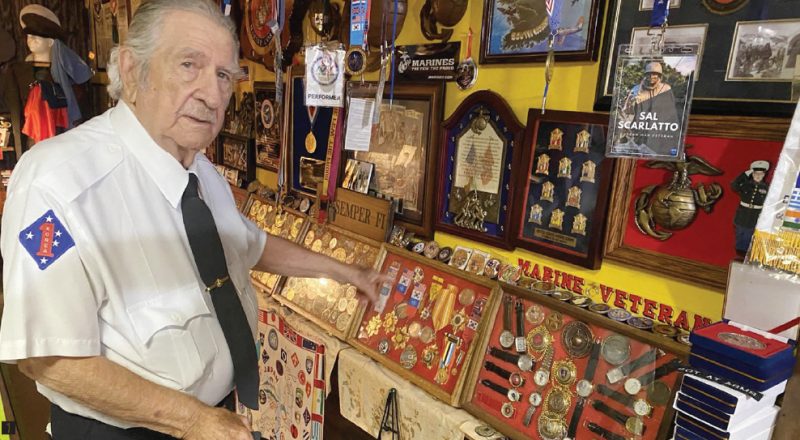“I still sleep on the couch every night because of the nightmares of that day.”
This year marks the 74th anniversary of the start of the Korean War, also known as the “Forgotten War.” Here, one man still lives in that day’s memory to ensure it is never forgotten.
The Korea Daily met with Salvator Scarlato, 91, the President of the Korean War Veterans Association (KWVA) Department of New York and Central Long Island Chapter, at his home in Hauppauge, Long Island, on June 22. Scarlato’s basement was filled with war records representing his pride in his service in the Korean War, but his eyes were filled with longing for his fallen comrades.

Born in Brooklyn, New York, in 1933, Scarlato joined the Marine Corps in 1951 and arrived in Incheon, Korea in 1952. He fought on the front lines the following year and returned to the United States in 1953, wounded in the hand, neck, and leg.
Scarlato hated Korea, yet he said, “I left my heart in Korea.”
Hated both America and Korea
“Too many of my fellow soldiers died in my arms,” Scarlato said, remembering the night he had to see his companion die for the first time. His fellow soldier, who was only a week away from returning home from the war, was shot in a sudden attack and collapsed on top of Scarlato. Despite Scarlato’s abdominal compressions to save him, he ended up cold in Scarlato’s arms. “I hated America and Korea, and I was furious why we had to sacrifice our lives for others,” he said.
A severed child’s hand in his pocket
However, his mind then changed when he witnessed the death of a child. In a village that had been bombed, killing most of its residents, he found a boy with his hand severed. Scarlato put the severed hand in his pocket and carried the child to an orphanage where he found a doctor. “The terrified child pulled me tightly around the neck with his one remaining hand,” Scarlato recalled. “I passed the child to the doctor and walked out, then remembered the hand in my pocket and went back in to deliver it, but the child already died.” As Scarlato held the child’s body and cried for a long time, he said he made a decision. “I will fight to the end to save these innocent Korean people.”

Inexistent record of the war
“Of the 175,000 American soldiers who fought in the war, 105,000 were wounded, 8,600 went missing, and 8,000 were taken prisoners of war,” said KWVA Vice President Sejong Ha, who served as an interpreter during the war. “Of the surviving American soldiers, 70 to 80 percent suffer from post-traumatic stress disorder (PTSD) and are unable to live a normal life after returning home.”
In spite of the sacrifices made, only a few records of the Korean War were available in the United States for decades. “In 1985, a veteran in New York told his daughter, who was going to write a report on the Korean War, to go to the library and look for resources. It was then when he was told, ‘There are no resources anywhere,'” Salvator said, adding, “This is why the KWVA was born.”
How did it become the “Forgotten War”?
It wasn’t until 1999, nearly 50 years after the Korean War broke out, that Korean War veterans began to be honored as war heroes. Up until then, the Korean War had been defined as a police action ordered by President Harry S. Truman. Only in 1999, when the South Korean government requested that American veterans receive medals, did Congress pass a resolution to restore the war’s status.
From ‘Forgotten War’ to ‘Not Forgotten’
Scarlato said he often hears “thank you for your service” from people on the street nowadays. That’s partly due to South Korea’s growing cultural and economic presence, which has made more people interested in the Korean War, but it’s also due to the tireless efforts of veterans from all 50 states. Since the association was formed, veterans across the country have launched an educational program called the Tell America Program, to educate the next generation of young people about why and how they fought for Korea, not just leaving it as a forgotten war. The veterans traveled to middle and high schools across the country to speak to students and visited churches and libraries to share their experiences with the general public.
Still lacking education about the Korean War
“There is still a lack of education about the Korean War,” the KWVA veterans said. “There are a few books about the Korean War in the library now, but because the Korean War was not as significant to the United States as other wars like the Vietnam War, it only takes up one or two pages in history textbooks,” Salvator said.
The Tell America Program is also not as active as it used to be. This is because fewer veterans are left, and most have already aged, making it difficult for them to travel and give speeches. “When the association was founded, we had more than 30,000 members, but now we only have about one-tenth of that,” Ha said. “The next generation of Korean Americans needs to know how we have the freedom we have today.”
Korea sparkled when he returned
Scarlato has visited South Korea nine times since the war, saying that the country was “sparkling” when he returned. He particularly remembers a fellow veteran from his 2010 visit saying, “It’s no different from Manhattan,” when he saw the night view of Seoul. Every time Scarlato visits Korea, he has mixed feelings. “It felt like Korea had nothing to fear anymore.”
Scarlato still finds it difficult to sleep in bed because of the still vivid memories of the war, so he seeks out the couch. When asked if he had any last words for the readers of the Korea Daily, he spoke in a trembling voice. “Please remember the Korean War,” Scarlato said, “and please don’t forget what our sacrifices meant.”
BY JIHYE YOON, HOONSIK WOO [yoon.jihye@koreadailyny.com]




